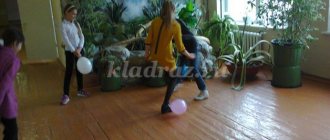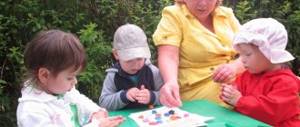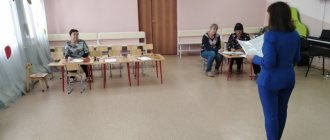Modern forms and methods of working with children
Elena Guryanova
Modern forms and methods of working with children
— health-saving technologies are a system of measures that includes the interrelation and interaction of all factors of the educational environment aimed at preserving the health of a child at all stages of his learning and development. These are dynamic pauses; physical education minutes; outdoor and sports games; relaxation; finger gymnastics; gymnastics for the eyes; breathing exercises; corrective gymnastics; physical education classes; physical education; musical and rhythmic activity.
- museum pedagogy. The work on creating mini-museums is carried out in cooperation with children and parents and involves not only the quality and quantity of information during acquaintance with the exhibitions of mini-museums, but also the awakening of creative activity. The purpose of the mini-museums being created is to involve children in activities and communication, and to influence their emotional sphere.
— using a children’s portfolio, together with parents, timely notes the child’s successes, supports his interest in various types of activities (classes, games, observations, physical exercises, etc., develops the child’s self-control and self-esteem skills. Certificates and the best drawings are included in the portfolio , pages from notebooks or copies with the most successful and accurate works , photographs of performances at concerts and competitions, crafts made.
— project activities. The project method is a promising form of work with children and parents that takes into account the current needs of the child and contributes to the formation of an active life position of the participants in the process and the transfer of experience in raising children.
- creative workshop. The purpose of work in a creative workshop is to preserve the child’s creativity, to provide assistance in realizing his capabilities, to promote the development of independence and creative initiative.
It contributes to the formation of a universal ability to construct any activity that is significant for a child, be it visual, speech, play, etc., as the creation of integrity (drawing, text, plot)
from different units, but using the same techniques.
-method of problem-based learning. The basis of method is the creation of situations, the formation of problems , and leading preschoolers to the problem. The problem situation includes the emotional, search and volitional side. Its task is to direct children’s activities towards maximum mastery of the material being studied, to provide motivational activity, and to arouse interest in it.
method . In the course of organizing experimental and experimental activities, students learn to observe, experiment, and draw conclusions; They develop independent, logical thinking, the ability to establish subject connections, and interaction skills.
Working with parents of junior schoolchildren
In my practice, I use the scientific and practical conference of parents “Raising Children in the Family.” During the conference, the following questions are resolved: 1. What is difficult for parents in raising children? 2. What methods of influence do parents use in raising children? 3. Pedagogical tact of parents. 4. Ways of self-education of parents. 5. What is the influence of the father on the child? 6. How do you organize your child’s free time? 7. Your suggestions for improving extracurricular work with children in elementary school. The school director, deputy directors for teaching and educational work and educational work take part in the conference. In preparation for the conference, we are publishing a newspaper dedicated to families where education is best. After the conference, a concert prepared by the children is a pleasant surprise for parents.
There has been a tradition of using such a form of work as parent training.
Both parents participate in parent trainings, this increases the effectiveness of the training, and the results are immediate. Parents are given the opportunity to temporarily feel like a child and emotionally relive childhood impressions.
With great interest, parents perform such training tasks as “children’s grimaces”, “favorite toy”, “my fairy-tale image”, “children’s games”, “childhood memories”.
When working with a group of parents, I often use this form as parent readings. It gives parents the opportunity not only to listen to the teacher’s lectures, but also to study literature on the problem and participate in its discussion.
A huge opportunity for cooperation between the school and the parents of children is provided by holding joint class celebrations. In my practice, I often use such cooperation. These are sports competitions: “Dad, Mom, I am a sports family”, matinees “Dad, Mom, I am a reading family” and “Dad, Mom, I am a friendly family”, a quiz for children and parents “Let’s play together”, games for the whole family “Happy Occurrence”, “Tic Tac Toe”, conversation - meeting of parents and children “You are in everyone’s heart, Motherland Russia!” , holidays dedicated to March 8 and Defender of the Fatherland Day and many others. Such holidays are interesting and fun.
I always accept with great joy parents’ help in preparing and holding traditional school holidays (New Year’s matinees, “Farewell to Elementary School” matinees).
In due time, my parents are always ready to help me. And I don’t skimp on kind words addressed to the most active helpers. At every meeting there are words of gratitude addressed to the parents who help me. Common affairs and interests of the class unite children and parents, help them find a language of communication, and have a positive impact on the formation of the child’s personality. The receptive souls of children are fertile soil capable of cultivating the seeds of knowledge, goodness, and morality. Children and parents are in constant search. The modern family has great intellectual potential, and the teacher’s task is to attract and skillfully use it when organizing children’s free time, filling their leisure time with activities that are useful for both health and mind.
Methods and forms of organizing work with parents in elementary school
METHODS AND FORMS OF ORGANIZATION OF WORK WITH PARENTS IN PRIMARY SCHOOL
Methodological development
Nikiforova Yulia Petrovna
Teacher of the specialty Teaching in primary classes.
In recent years, the crisis of the family institution has deepened. As sociological surveys and statistical data show, the prestige of the family, fatherhood and motherhood is declining in the country, the birth rate is falling, the number of divorces and the number of single mothers are growing. Along with this, there are often situations when in seemingly prosperous families, parents, having provided the child with all material benefits, practically do not engage in his upbringing. Very often, families lack professional assistance in organizing family education. These phenomena should be taken into account by the teacher when working with parents to raise children.
In addition, for the successful implementation of federal state educational standards of the new generation, it is necessary to strengthen ties between teachers of an educational institution and parents of students. This requires the development of forms and methods of interaction between teachers and parents of children, educational institutions and families. In elementary school, this is most important, since working with younger schoolchildren has its own characteristics, determined by the age and life experience of the children, the transition to developmental education from the age of six, and a sharp decrease in the number of children who attended kindergartens before school.
The forms and methods of school work with parents must be aimed at increasing the psychological and pedagogical culture and knowledge of parents, strengthening interaction between school and family, involving parents in the educational process and participation in school self-government.
The choice of forms and methods of working with parents, along with taking into account their needs and interests, should ensure, with the guiding role of school teachers, the formation of an active position of parents, their readiness to interact with the teaching staff. After all, many problems (prevention and prevention of violations of the rules of conduct, increasing motivation to study and identifying the causes of lag in it, and others) can be effectively solved by interacting with the student’s parents.
Forms and methods of working with parents in elementary school must certainly take into account the psychological characteristics of younger schoolchildren, whose cognitive processes are restructured during this period, thinking develops, self-regulation of behavior and will are formed, competence and self-confidence appear, the sphere of communication expands, and relationships in the educational environment are formed. team, etc.
Methods of working with parents
include conversations, various tests and questionnaires, observations. Forms of work include parent meetings, conferences (at the class or school level), consultations, home visits (traditional forms), non-traditional - discussions, workshops, round tables, oral journals, trainings.
At the same time, forms and methods of working with parents can be individual and collective.
Individual ones include surveys, visits to the child’s home, individual conversations or consultations, the use of various reminders, studying the student’s family based on documents, meetings, and others. Collective activities include parent meetings, thematic events, lectures, clubs, conversations and parent consultations.
The work of a primary school teacher with parents can be divided into three successive stages.
- The first stage covers the initial period of children's stay at school, starting from the moment they enter. At the first stage, acquaintance with the families of schoolchildren, the living conditions and living conditions of children is carried out. For this purpose, available documents and conversations with parents and children, including with the participation of a school psychologist, are used. An effective approach is to conduct a parent survey. Analysis of questionnaires allows you to learn about the methods of upbringing in the family, the child’s hobbies and behavior, his household responsibilities, and character traits. The information obtained at this stage serves as a starting point for planning work with parents.
The first parent meeting is very important at this stage, where parents are introduced to both regulatory documents (legislative documents on education, school charter, educational standards) and the main aspects of the child’s stay at school. Reminders distributed to parents help them navigate their child’s school life. Memos can contain both general information and represent the result of the work experience of a particular teacher. A parent committee elected at the first meeting can provide great assistance in organizing the interaction of parents and teachers in the education and upbringing of children.
- The second stage covers the period before the student graduates from primary school. He is the main one in working with families of primary schoolchildren. At this stage, various forms and methods of mutual activities of teachers and parents in raising and educating children are used. In this case, the teacher must:
- increase the level of pedagogical knowledge of parents;
- guide the work of parents in guiding their children’s studies at home;
- help parents in choosing means and techniques for raising children;
- strengthen the trust of children and parents in the teacher and the authority of parents in the eyes of children;
- expand the participation of family members of younger schoolchildren in educational work and school events.
Let us consider in more detail the forms and methods of working with parents used at the second stage.
A parent meeting, being a traditional form of working with parents, can be built in a new way, using various techniques and approaches (debates, elements of a business game, seminars, discussion of books or films). Various exhibitions (of the best works, notebooks, drawings, crafts, achievements in sports) showing the intellectual development of children can be timed to coincide with parent meetings. The club form of working with families has proven itself well.
A great effect in education, strengthening connections and mutual understanding between parents, children and teachers is provided by joint events: concerts and performances of children for family members, class trips with parents to nature, excursions to museums, the zoo, visits to theaters and various other events. They also promote team building in the classroom. Wide possibilities in the joint educational work of family and school are opened up by the involvement of the children's grandparents.
The unification of parents and children is facilitated by their joint work in studying the history of their family. It can be carried out in the form of classroom hours during children's education in primary school. During class hours, children get acquainted with concepts and information about genealogies, professions and surnames of relatives, family holidays and traditions, and participation of relatives in the war.
Grandparents of primary schoolchildren, who, having extensive life experience, free time, and desire, often are ready to participate in joint work in raising children, have significant potential in strengthening the interaction between the teaching staff and the family. As practice shows, involving them in organizing events gives a good educational effect.
Modern information technologies offer great opportunities for improving work with parents on the part of the teacher and strengthening connections with them. They can be used both in organizing the events discussed above (class hours, studying family history, holding various holidays), and for promptly informing parents, for example, by keeping an electronic diary, accessible to parents via the Internet. Moreover, you can organize it in the form of your own classroom social network, with the help of which parents have the opportunity to contact each other or the teacher at any time.
We must not forget about this form of work (previously actively used) as visiting children at their place of residence for the purpose of individual work with parents and getting to know their living conditions.
- The third stage of a primary school teacher’s work with parents covers the time period after the student’s graduation from primary school. At this stage, it is important for the primary school teacher to transfer the accumulated experience of working with children and their parents to their colleagues who accept children in high school. This will greatly help maintain continuity in educational and educational work with children and interaction with their families.
And, of course, the effectiveness of working with parents, and ultimately the quality of education, the results of educating younger schoolchildren largely depends on the skill of the teacher, his authority in the eyes of children and parents.
This is due to the fact that younger schoolchildren form self-esteem based on their assessment by the teacher and the results achieved in their studies. From the first days of teaching children in primary school, a teacher becomes an indisputable authority for them, which is one of the most important prerequisites for training and education in the lower grades.
On the part of parents, there are three factors in assessing the teacher: whether the teacher has pedagogical authority in the perception of parents, the level of individual work with their child, and the educational attractiveness of the teacher.
The practice of working with parents shows that the active use of the above-mentioned new and traditional forms of work with parents in elementary school helps parents improve the upbringing of their children, strengthens the relationship between parents and children, and allows children to develop their abilities for cooperation, creative self-expression and self-confidence.




